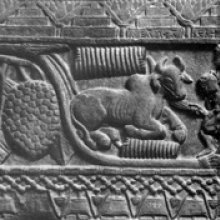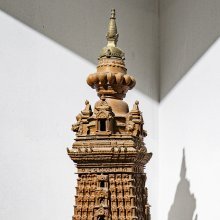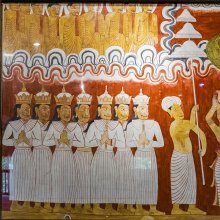Mahabodhi, Mahābodhi, Maha-bodhi: 9 definitions
Introduction:
Mahabodhi means something in Buddhism, Pali, Hinduism, Sanskrit. If you want to know the exact meaning, history, etymology or English translation of this term then check out the descriptions on this page. Add your comment or reference to a book if you want to contribute to this summary article.
Images (photo gallery)
In Hinduism
Purana and Itihasa (epic history)
Source: Cologne Digital Sanskrit Dictionaries: The Purana IndexMahābodhi (महाबोधि).—A tīrtha sacred to the Piṭrs.*
- * Matsya-purāṇa 22. 33.

The Purana (पुराण, purāṇas) refers to Sanskrit literature preserving ancient India’s vast cultural history, including historical legends, religious ceremonies, various arts and sciences. The eighteen mahapuranas total over 400,000 shlokas (metrical couplets) and date to at least several centuries BCE.
In Buddhism
Theravada (major branch of Buddhism)
Source: Pali Kanon: Pali Proper Names1. Mahabodhi. See Bodhirukkha.
2. Mahabodhi. See Bodhirajakumara.
3. Mahabodhi Thera. He belonged to the Mahavihara, and wrote the Commentaries on the Paramatthavinicchaya and the Saccasankhepa. P.L.C.174.
Theravāda is a major branch of Buddhism having the the Pali canon (tipitaka) as their canonical literature, which includes the vinaya-pitaka (monastic rules), the sutta-pitaka (Buddhist sermons) and the abhidhamma-pitaka (philosophy and psychology).
Languages of India and abroad
Sanskrit dictionary
Source: DDSA: The practical Sanskrit-English dictionaryMahābodhi (महाबोधि).—
1) the great intelligence of a Buddha.
2) a Buddha.
Derivable forms: mahābodhiḥ (महाबोधिः).
Mahābodhi is a Sanskrit compound consisting of the terms mahā and bodhi (बोधि).
Source: Cologne Digital Sanskrit Dictionaries: Edgerton Buddhist Hybrid Sanskrit DictionaryMahābodhi (महाबोधि).—(= Pali id.) = Bodhi 3, q.v.
Source: Cologne Digital Sanskrit Dictionaries: Shabda-Sagara Sanskrit-English DictionaryMahābodhi (महाबोधि).—m.
(-dhiḥ) A Budd'ha, a deified teacher of the Baudd'has. E. mahā great and bodhi a teacher.
Source: Cologne Digital Sanskrit Dictionaries: Monier-Williams Sanskrit-English Dictionary1) Mahābodhi (महाबोधि):—[=mahā-bodhi] [from mahā > mah] m. or f. the gr° intelligence of a Buddha, [Buddhist literature]
2) [v.s. ...] m. a Buddha, [cf. Lexicographers, esp. such as amarasiṃha, halāyudha, hemacandra, etc.]
3) [v.s. ...] a [particular] incarnation of B°, [Jātakamālā]
Source: Cologne Digital Sanskrit Dictionaries: Yates Sanskrit-English DictionaryMahābodhi (महाबोधि):—[mahā-bodhi] (dhiḥ) 2. m. A Buddha.
[Sanskrit to German]
Sanskrit, also spelled संस्कृतम् (saṃskṛtam), is an ancient language of India commonly seen as the grandmother of the Indo-European language family (even English!). Closely allied with Prakrit and Pali, Sanskrit is more exhaustive in both grammar and terms and has the most extensive collection of literature in the world, greatly surpassing its sister-languages Greek and Latin.
See also (Relevant definitions)
Starts with: Mahabodhi Jataka, Mahabodhisamgharama, Mahabodhitaru, Mahabodhivamsa.
Full-text: Mahabodhisamgharama, Nissayatthakatha, Mahabodhyangavati, Bodhi, Viyoga, Bodh Gaya, Paramatthavinicchaya, Malin, Mahanama, Nagadipa, Ajitakesakambala, Upatissa, Pakudha Kaccayana, Mahavihara, Kalingabodhi Jataka.
Relevant text
Search found 33 books and stories containing Mahabodhi, Mahābodhi, Maha-bodhi, Mahā-bodhi; (plurals include: Mahabodhis, Mahābodhis, bodhis). You can also click to the full overview containing English textual excerpts. Below are direct links for the most relevant articles:
The Life of Sariputta (by Nyanaponika Thera)
Anāgārika Dharmapāla (by Bhikkhu Sangharakshita)
Dipavamsa (study) (by Sibani Barman)
Metta (by Ācariya Buddharakkhita)
The Great Chronicle of Buddhas (by Ven. Mingun Sayadaw)
Part 4 - The Bodhisatta heads towards the Mahābodhi < [Chapter 7 - The Attainment of Buddhahood]
Part 2 - The Week of the Gaze (Animisa Sattāha) < [Chapter 8 - The Buddha’s stay at the Seven Places]
Part 7 - The Great Homage paid by the Devas and Brahmās < [Chapter 7 - The Attainment of Buddhahood]


